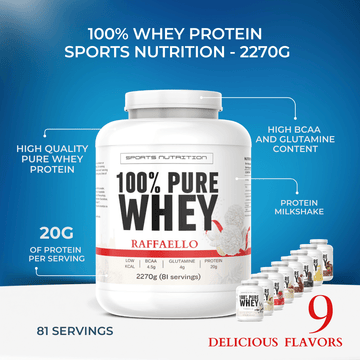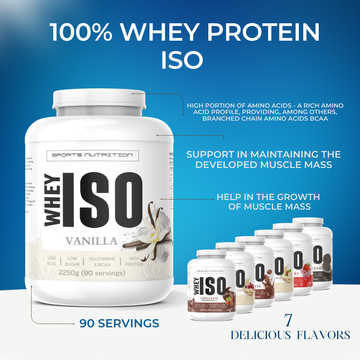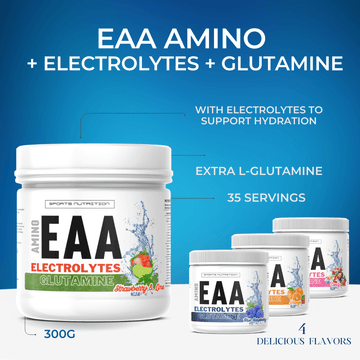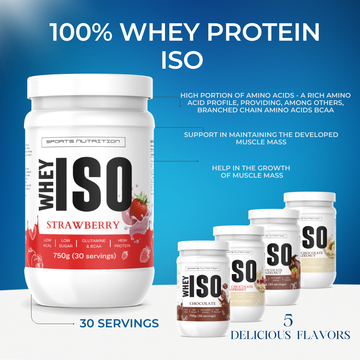L-Carnitine
L-carnitine - what is it?
L-carnitine is an organic chemical compound that is synthesized from two amino acids -lysine and methionine - in the human liver, kidneys and brain. The adult human body contains about 20 g of L-carnitine located mainly in the skeletal muscles and the heart (about 98%).
Carnitine occurs in the body in the form of two optical isomers: with the relative configuration D or L. However, only the L form exhibits biological activity and in this form carnitine should be present in the daily diet or supplemented.
L-carnitine plays an important role in lipid metabolism as it transports long-chain fatty acids to the mitochondria, where they are transformed (beta-oxidized) to generate the energy necessary for cell function. L-carnitine is thus a transporter of hydrophobic molecules across their impermeable mitochondrial membrane. At the same time, it removes short- and medium-chain fatty acids from the mitochondria, which in too high concentration have a toxic effect. In addition, it has the ability to lower cholesterol and triacylglycerols.
L-carnitine benefits:
L-carnitine has many functions in the body:
- participates in lipid metabolism, has the ability to lower the level of triacylglycerols and cholesterol
- it is responsible for the transport of long-chain fatty acids to the mitochondria where they are transformed into energy necessary for the proper functioning of cells
- affects the activity of hormones such as testosterone and thyroid hormones. The latter are responsible for burning fats. In hypothyroidism, when the level of hormones is lowered, consumption of hormones decreases, fats begin to accumulate and the level of carnitine decreases
- is involved in the transport of unnecessary metabolites from the cell to the outside
- intensifies the processes of burning fatty acids , thus inhibiting the formation of adipose tissue, and thus obesity. As a result of its action, the caloric demand is reduced
- its high content in the brown tissue of newborns indicates its important role in the thermogenesis process and participation in the adaptation of the organism to the external environment
- participates in the transformation of carbohydrates. Its high level in the muscles reduces the use of glycogen as an energy material. It is especially important in conditions of intense physical exertion
- has an antioxidant effect. Protects and stabilizes proteins and phospholipids included in cell membranes (e.g. stabilizes the cell membranes of red blood cells - erythrocytes)
- has the ability to chelate (permanently combine organic substances with metal ions) such elements as: lead, cadmium, iron. It allows them to be transported and disposed of in large quantities.
L-carnitine and weight loss
The effect of L-carnitine on slimming has its biochemical justification. L-carnitine is related primarily to the oxidation of fatty acids, i.e. fat burning. The participation of L-carnitine in the metabolism of fatty acids increases their use as an energy source. Thanks to this, the processes of burning fatty acids are intensified, and thus the formation of reserves in the form of subcutaneous fat. Therefore, increasing its concentration will have an impact on the slimming effect of using L-carnitine.
L-carnitine reduces energy demand and improves exercise capacity, which is very important from the point of view of people practicing sports. And as you know, physical activity is one of the pillars of healthy weight loss.
L-carnitine dosage
The need for L-carnitine has not been defined in the nutritional standards. The research shows, however, that a healthy adult person should consume about 0.3-1.9 mg of L-carnitine per 1 kg of body weight per day. With diet we can provide from 20-200 mg of carnitine per day, but with a high consumption of meat rich in this substance, the amount can increase to 300 mg. Food products rich in L-carnitine more popular dishes: chicken fillet (34.4 mg / 100 g), minced pork (60.8 mg / 100 g). Dairy products, fruit and vegetables contain small amounts of carnitine, e.g. Camembert cheese (5.5 mg / 100 g), goat cheese (1.82 mg / 100 g), cottage cheese (29.9 mg / 100 g), buttermilk (38,5 mg/100 g), cucumber (4.46 mg / 100 g), mushrooms (29.8 mg / 100 g), oranges (0.36 mg / 100 g). Therefore, people on a vegetarian diet should use supplements that complement this compound.
It is most often recommended for people who are at risk of deficiency of this compound. In some cases, a doctor or experienced nutritionist may recommend L-carnitine supplementation. How to use this type of supplements? As recommended by a specialist or the information contained in the leaflet.
At Megapump you can find many L-carnitine supplements in liquid, tablets or capsules form










